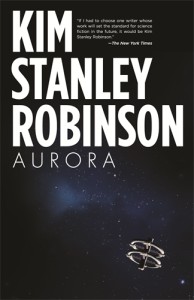“Aurora” by Kim Stanley Robinson
 I’ve been meaning to get around to reading Kim Stanley Robinson’s work for a while (I’m woefully underread in the sci-fi classics), so I was delighted to get an unexpected copy of Aurora, his latest book. One of Earth’s first generation ships sent to colonize beyond our solar system is almost at its target, Aurora, a moon of the Tau Ceti system. They’re prepared for some difficulties but even then, the reality of colonization turns out to be much more complicated than anyone anticipated.
I’ve been meaning to get around to reading Kim Stanley Robinson’s work for a while (I’m woefully underread in the sci-fi classics), so I was delighted to get an unexpected copy of Aurora, his latest book. One of Earth’s first generation ships sent to colonize beyond our solar system is almost at its target, Aurora, a moon of the Tau Ceti system. They’re prepared for some difficulties but even then, the reality of colonization turns out to be much more complicated than anyone anticipated.
Generation ships are a pretty common idea in science-fiction, and they always seem so cool – people taking great personal risks and braving the unknown for the sake of exploration. Aurora takes a long, hard look at the reality of this concept and the morality of subjecting your descendants to living in a tin can decades away from anyone who can help them if something goes wrong. The residents of the ship make the best of the hand they’ve been dealt, but they’re fundamentally in a life they would have never have chosen – they’re heading to a place that may not even be habitable, but constantly see news feeds from an Earth that they could have flourished on. They have very few personal liberties (reproduction and choice of work have to be regulated to maintain the ship), but have access to literature and media that shows them exactly how controlled their life is compared to the norm.
The narrative voice of this book is interesting – the story is told to us mostly from the point of view of the ship, who started out as an AI that relied entirely on its programming, but is slowly gaining consciousness with the help of Devi, the ship’s de facto chief engineer. The text is presented as a chronicle that Devi asks the ship to write, except the first and last chapters. The ship mostly chronicles the journey via Devi’s daughter Freya, who grows from being a teenager in the beginning of the book to become a leader of her people. The style evolves subtly as the ship learns and observes more, and there are occasional meditations on the nature of self and consciousness, and the process of narrative itself, which are just as fascinating as the colonists’ story.
Ship was easily my favourite character in the story – we are somewhat detached from pretty much all the other characters, but I don’t mind that in hard science fiction stories like this one. Except for Freya and those close to her, most of the other humans are just seen as representatives of the factions and ideas they represent. Even Freya dulls in comparison to her mother Devi, who helped the ship grow and reason in unprecedented ways. She’s not actually present in a large portion of the book, but her furious drive leaves a lasting influence that is felt through the actions of both the ship and Freya, and she’s the character that we can empathize with the most.
Also, the science in this book was fantastic. I cannot vouch for the authenticity of the physics or the biology/ecology, but it seemed as well-researched and accurate as the computer science algorithms and problems that the ship uses in its narrative. It wasn’t as riveting as the science in The Martian, but it was still a lot of fun to read. I’m fascinated by maintaining sustainable ecosystems in a closed environment – The Quiet War did a lot of that too.
I was expecting that this would be a triumphant tale of humanity overcoming adversity and making their mark on the stars, but Aurora is not constrained by that trite idealism. The portrait of humanity that it paints is not pretty – humans want to see themselves as pioneers, but are often petty, confused, violent, and all too happy to deprive others of safety to achieve something abstract. It was more depressing than I had hoped it would be, but there’s comfort in examining the consequences of an idea thoroughly, and it ends on a note of hope – not for humanity’s grand dreams, but the knowledge that humans can always learn and adapt.

Pingback: “Fade to Black” by Francis Knight | Just a World Away